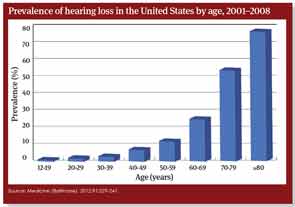A 2009 study of the cost-effectiveness of cochlear implantation in older adults noted that “greater benefits are found with earlier implantation and shorter duration of deafness prior to implantation” (Health Tech Assess. 2009;13:1-330).
Explore This Issue
October 2013“There is a direct correlation between the length of time from loss of benefits from amplification and intervention with cochlear implantation and the ultimate outcome,” Dr. Hertzano said. If cochlear implantation must wait, maintaining best-possible amplification with hearing aids will not only improve interim quality of life, but also increase the chances of good hearing outcomes after eventual implantation.
Restoring hearing sooner rather than later through cochlear implantation may preserve central auditory function. “With more prolonged periods of hearing loss, you literally can see atrophy in parts of the brain that handle speech processing,” Dr. Lin said. Earlier cochlear implantation may delay brain atrophy and increase the levels of hearing older adults are able to obtain from cochlear implantation.

Source: Medicine (Baltimore). 2012;91:229-241.
Unilateral or Bilateral Cochlear Implants?
At present, unilateral cochlear implantation is far more common in older adults than bilateral implantation. The preference for unilateral implants is related to concerns about the ability of older adults to tolerate surgery, uncertain insurance coverage for bilateral implants and questions regarding the cost-effectiveness of unilateral versus bilateral cochlear implants.
“For older adults, we almost always start with unilateral implantation,” Dr. Lin said. “Then, depending on how the patient does six months to a year later, if they feel like they need a second one because the other ear really isn’t hearing anymore, we would consider a bilateral. We don’t really ever do simultaneous bilateral implantation, because most older adults do just fine with one. Simultaneous bilateral implantation doubles the surgery length, and reimbursement can get very, very tricky.”
In the future, bilateral cochlear implantation in older adults may be more common. A 2013 study found that bilateral implantation improves speech perception in noisy environments, and helps adults accurately localize sounds. Bilateral implantation also provides a backup system should one implant fail, even temporarily. However, the cost-effectiveness of bilateral implantation over unilateral implantation has not been established (Otol Neurotol. 2013;34:190-198).
Post-Implant Life
Most older adults tolerate cochlear implantation surgery and the subsequent rehabilitation extremely well; however, careful pre-operative selection and teaching can increase the chances of patient satisfaction after implantation and activation.
Leave a Reply